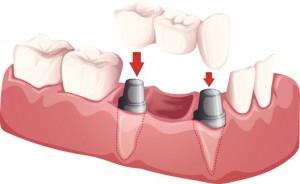Dental Implants May Benefit Diabetic Patients
New research suggests diabetic patients can make good dental implant candidates.

Unfortunately, for many years dentists were reluctant to recommend dental implants for diabetic patients. The concern was that diabetes had been linked with slow healing and high infection rates following dental surgeries.
However, new research from the UT Health Science Center in San Antonio, Texas suggests that this old wisdom may be outdated. The study, which was published in a recent issue of the Journal of the American Dental Association, showed that there was no difference in the final success rate of dental implant procedures for diabetic and non-diabetic patients. This was true even of patients with poorly controlled diabetes.
The study compared the experience of 110 patients, one third of whom had well-controlled diabetes with a A1C glycemic blood test score of 6 to 8 percent and one third of whom had poorly controlled diabetes with a score of 8 percent or higher. The remaining third of the patients were not diabetic.
All of the patients had two dental implants placed in the lower jaw as a foundation for an implant-supported denture. The implant success rate was extremely high–out of the 110 patients, only two had complications resulting in the failure of the first procedure. However, these patients were able to receive a second set of implants which healed perfectly, so they too had a successful result at the end of one year.
The one notable difference between the patients with poorly controlled diabetes and the rest of the patients was that the individuals with poorly controlled diabetes did heal more slowly following the implant procedure. For this reason, all patients in the study had their implant-supported denture placed 4 months after surgery rather than 2 months after as would have been a more normal schedule.
The results of this study should be very encouraging for diabetic patients with missing teeth. Dental implants may very well be a good solution to missing teeth for those patients, provided they are placed by a skilled implant dentist with an understanding of the special needs of diabetic patients and sufficient healing time is allowed.
If you would like to learn more about dental implants, please contact California Dental Group now.




